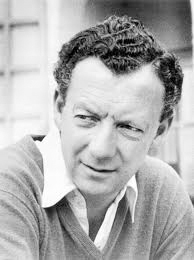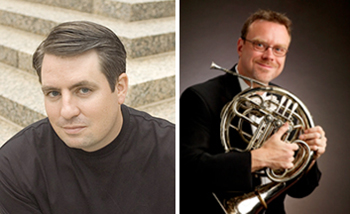by Daniel Hathaway

Britten almost invariably wrote for specific performers with their special musical gifts in mind. In many cases, their interpretations have become proprietary — perhaps one of the reasons other musicians have been reticent about taking them on. But Dennis Brain ran his car into a tree returning from the Edinburgh Festival in 1957, and ten years after Britten’s own demise, Peter Pears died at the Red House in Aldeburgh in 1986. That left the Serenade field wide open — at least for virtuoso horn players with embouchures of steel and high tenors with exquisite literary sensibilities.
Happily, The Cleveland Orchestra was able to secure the services of the excellent American tenor Matthew Polenzani, and brought up a superb solo player — principal hornist Richard King — from its own ranks for its first-ever performance of the Serenade on Thursday evening, October 10 at Severance Hall under the baton of Marek Janowski.
The work began and ended with King offstage, playing a distant, soulful prologue and epilogue without using valves to tune the pitches. In between came eloquent settings of Charles Cotton’s charming Pastoral, Alfred, Lord Tennyson’s echoing Nocturne, William Blake’s soliloquy to a decaying rose, Elegy*, the frightening 15th century Lyke wake Dirge, Ben Johnson’s glittering Hymn (to Diana), and John Keats’s elegant sonnet to sleep, O soft embalmer of the still midnight.
Fresh from Così fan tutte at The Metropolitan Opera, Polenzani declaimed all that striking poetry with fine diction, clear tone and flawless vocal prowess, floating the scary “This ae nighte” at the beginning and end of the Dirge and tossing off the complex runs in the Hymn with clarity and ease. King was quite marvelous in his varying roles as mood setter, fanfareist and commentator, balancing perfectly with Polenzani and pulling off a difficult and strenuous piece with accuracy and a consistently golden tone. Janowski molded the work with sensitivity and supple tempos, though in some cases — the Dirge and the Hymn — those were rather too quick for the character of the music.
For these concerts, the Britten was surrounded with French music: Fauré’s Pelléas et Mélisande suite and César Franck’s symphony. There wasn’t an overriding theme, as the annotator admitted: “This week’s program brings together three composers from two different countries — and multiple sensibilities.”
The Fauré provided a gentle, soft-edged beginning to the evening with velvety string playing colored by poignant wind solos. Flutist Joshua Smith and harpist Trina Struble were the stars of the well-known Sicilienne and trumpeter Lyle Steelman commented profoundly on Mélisande’s death.
Franck’s symphony, which falls well within the capabilities of a good youth orchestra, received predictably distinguished treatment from The Cleveland Orchestra, who can bring out its inner secrets and blend its dark, wind choir sections like the master craftspeople they are. Conducting without score, as he had for the Fauré, Marek Janowski presided over a nicely-layered, transparent reading that might have achieved more sweep when the big tunes came around (as they did repeatedly) and more precision in attacks and end-of-phrase arrivals. The audience was appreciative but not effusive.
In retrospect, it was interesting to think what works might have more purposefully framed the Britten. His own Simple Symphony as an opener? Something by his mentor, Frank Bridge? Vaughan Williams? Elgar? Delius? Why not, for the sake of context, a whole British program?
*Four of the poem’s eight lines were omitted from the program book. Here is the whole text.
The Sick Rose
O Rose thou art sick.
The invisible worm,
That flies in the night
In the howling storm:
Has found out thy bed
Of crimson joy:
And his dark secret love
Does thy life destroy.
—William Blake
Published on ClevelandClassical.com October 12, 2013
Click here for a printable version of this article.



